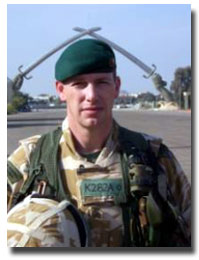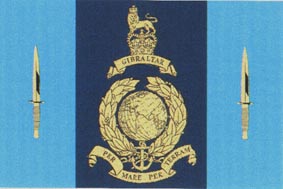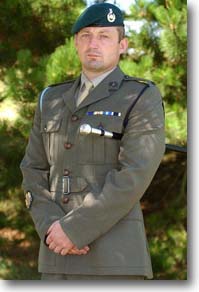40 Commando RM
40 Commando Royal Marines is based at Norton Manor Camp 2 miles North of Taunton, Somerset. The Unit was formed on the 14th February 1942 during the Second World War and moved to its present location in May 1983.
History of 40 Commando Royal Marines
Formed in 1942, from A Commando, 40 Commando was the first RM Commando Unit. It saw early action during the raid on Dieppe in August of that year. From 1943 to 1945 the Commando was involved in the Italian Campaign, at Termoli, Lake Comacchio and subsequently in Yugoslavia. For its decisive action the Commando was awarded the Termoli battle honour.
Following the second world war the Commando was deeply involved in Palestine acting as the rearguard in the Protectorate, leaving in 1948. They subsequently undertook security duties in Cyprus, Hong Kong and Egypt before moving to Singapore in 1961, where it was involved in operations during the confrontation with Indonesia throughout the following decade.
In 1971 the Commando left Singapore and re-established itself in Seaton Barracks, Plymouth. Over the next decade the Commando found itself deployed to Northern Ireland four times and also undertook an unexpected two month tour in Cyprus after the invasion by the Turkish Army.
In 1982, following the Argentinean invasion of the Falkland Islands, the Commando deployed on Operation Corporate. On 21 May the Commando were among the first troops ashore and secured the beachhead at San Carlos. The Unit was subsequently split having two companies attached to the Welsh Guards, preparing to attack Port Stanley, when the Argentinean surrender came.
On their return the Commando spent the rest of the decade involved in a variety of tasks including two Northern Ireland tours to South Armagh, a six-month Peace-Keeping tour in Cyprus and a six month operational tour in Belize. During the tour in Cyprus the Commando was awarded the Wilkinson Sword of Peace for the third time. Also during this period, in 1983, the Commando relocated to Norton Manor Camp near Taunton.
In 1991 the Unit undertook its first Norway deployment but found itself undergoing a dramatic climatic change when, due to the Gulf War, it deployed to Northern Iraq to ensure the security of Kurdish refugees. Northern Ireland tours, Norway winter deployments and a major Asia-Pacific Exercise kept the Commando busy through the following years.
In 1998 a substantial part of the Commando deployed to the Congo to ensure the safe evacuation of UK nationals from Kinshasa City.
The new millennium saw the Commando deploy to Northern Ireland and on their return they were the first Commando to reorganise under a new structural concept called Commando 21.
The Unit deployed in its entirety in January 2003, initially part of the Naval Task Group (NTG) 03 in HMS Ocean, Ark Royal and RFAs Sir Galahad and Tristram. The group sailed through the Mediterranean, after a brief stop at Cyprus, continuing through the Suez Canal bound for the Arabian Gulf. The United Nations were engaged in diplomatic efforts to avoid the need for military intervention in Iraq as the Unit was busy rehearsing in the United Arab Emirates and Kuwait for possible operations against Sadaam Hussein's repressive regime.
In March 2003 a coalition force, under the overall command of the United States, entered Iraq with the expressed intention of liberating its population from persecution and removing the intolerable threat to global security posed by its dictator.
During Operation TELIC, the liberation of Iraq, on the night of 20 March 2003, 40 Commando, under the command of Lt Col G K Messenger OBE, mounted an amphibious helicopter assault to seize key Iraqi oil infrastructure on the Al Faw peninsula. As the first conventional troops on the ground, the strategic significance of the operation was immense and, as the Divisional Main Effort, the assault was supported by a vast array of coalition firepower.
The Commando Group's role in the success of the coalition operation in Iraq was pivotal and profound. In a two-week period of intense operations, it secured key oil infrastructure, cleared a large expanse of enemy held terrain, and defeated a major enemy stronghold on the periphery of Basra, killing over 150 Iraqi soldiers and taking 440 prisoners.
2004 has seen the Unit's return to Iraq as part of a multi-national division peace-support operation. Under the command of Lt Col R W Watts OBE, it has been instrumental in maintaining the security of the country's infrastructure with particular attention being paid to the oil-pipelines in the southern region that keep the economic 'life-blood' of Iraq flowing. Additionally, the Commando has been responsible for convoy protection, counter insurgency and border security operations.
As the role of the Commando develops it is increasingly contributing to the development of the fledgling security forces within Iraq and the Unit's commitment, in-theatre, until early 2005, will see it well placed to assist in the country's forthcoming landmark elections.
COMMANDING OFFICER
 Lieutenant Colonel D C M King Royal Marines
Lieutenant Colonel D C M King Royal Marines
David King joined the Royal Marines Reserve as a marine recruit in 1984. As a reservist he completed commando and parachute training and specialised as a signaler. In 1988, having completed a Bachelor of Science degree in Nautical Studies, he was commissioned into the Royal Marines. He completed Royal Marines Young Officer training and was awarded the Sword of Honour.
From 1989, he spent three years in 40 Commando as a Rifle Troop Commander and then Anti-Armour officer. As such he conducted exercises across the globe including environmental training in the jungle, desert and arctic. Operationally, in 1990 he deployed to West Africa to plan and prepare the evacuation of British nationals from Liberia. Following the 1991 Gulf War, he deployed with 40 Commando to Northern Iraq to prevent further incursion by Iraqi forces and to provide humanitarian assistance to the local Kurdish population.
After the Junior Command and Staff Course, he instructed at the British Army's School of Infantry. This was followed by appointment as Adjutant at the Commando Training Centre Royal Marines. Another secondment followed, to the Britannia Royal Naval College, where he commanded a Division of Royal Navy officers under training. In 1997, he attended the UK's first Joint Services Advanced Command and Staff Course, simultaneously completing a Masters degree in Defence Studies from Kings College, London.
1998 saw a return to Commando service as a Company Commander in 45 Commando, based in Scotland. The next two years included further time in both jungle and arctic and an amphibious deployment to provide assistance in Central America following Hurricane 'Mitch'. In 2000, he was appointed Amphibious and Joint Warfare staff officer to the Commander United Kingdom Task Group, a 2* Maritime Battlestaff, as exercise planner for the 'Naval Task Group 2000' deployment that circumnavigated the world.
Promoted to Lieutenant Colonel in December 2000, he returned to the Commando Training Centre to coordinate Royal Marines individual training. In 2002 he worked for the Director Royal Marines, playing a significant role in the organisation and deployment of operations in Afghanistan and Iraq. He then completed a strategic study to integrate the Royal Marines fully within the wider operational structure of the Royal Navy. Most recently, he spent 12 months as Operations Officer to the 2* Commander UK Amphibious Forces.
Lieutenant Colonel King assumed command of 40 Commando Royal Marines in November 2004 while on Operation Telic V in Iraq.
Married with two young sons, the family live in Somerset. His favoured sports are rugby, cricket and squash.
WO1 (RSM)
WO1 McGill was born in 1968 in Kendal Cumbria, and entered the services on February 4th 1985. After completing basic training he joined 40 Commando RM and was employed in 6 troop Bravo Company. During this first draft he saw active service in Northern Ireland as a Lance Corporal and participated in major exercises in Norway and Germany.
Late in 1988 saw him join the Air Defence Troop where he went on to attend the Junior Command Course in 1989 and subsequently qualifying as a HW2(AD). During this draft he later volunteered, attended and subsequently passed the Mountain Leader Course second class concluding in April 1991. He was drafted on completion of the course to the Mountain and Arctic Warfare Cadre and immediately deployed on Op Haven where he contributed to a very successful operational deployment. W0 1 McGill spent the next two years working as an instructor within the cadre and later as a patrol 2IC in the newly formed Brigade Patrol Troop where he deployed on numerous exercises and Winter deployments.
During early 1994 he re-joined 40 Commando and worked in Charlie Company as a Section Commander. August of that year saw him attend and successfully pass the Mountain Leader Class One Course. A Senior Command Course followed soon after where on completion he took up his first appointment as unit ML for the then Headquarters and Signals Squadron of 3 Commando Brigade. A busy two year draft ensued with a unit Winter deployment, Royal Tournament commitment and Mountain training packages. During the mid to late 90s he undertook a number of drafts including CTCRM and Cold Weather Warfare Adviser to Troops South Georgia to name but two.
Gaining promotion to Colour Sergeant in May 2001 W0 1 McGill was appointed as the Chief Instructor of the ML Training Cadre where he was responsible for managing ML Branch technical matters and acted as course Sergeant Major for the Mountain Leader Class One Course. During this time he also deployed to the Oman in support of Omani Special forces Cliff assault training.
May 2002 saw W01 McGill attend Advanced Command Course 1/02. Successful completion of this course saw him appointed to the Commando Logistic Regiment as Squadron Sergeant Major of Medical Squadron. During his tenure he deployed on Op Telic and took part in Winter Deployment 2004.
In March 2004 he successfully completed his Regimental Sergeant Major Board and was appointed to 40 Commando RM in October 2004.
Ian and his wife Tabitha live in Plymouth, Devon with their son Sam.

